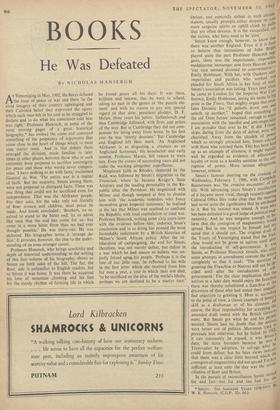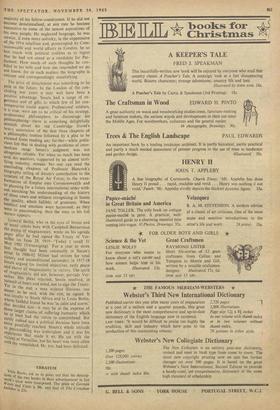BOOKS
He Was Defeated
By NICHOLAS MANSERGH
AT Vereeniging in May, 1902, the Boers debated the issue of peace or war and there 'in the vivid imagery of their country upbringing and their Calvinist belief they expressed the agony which each man felt in his soul as he struggled to declare and to do what his conscience told him was right.' Professor Hancock, in some of the most moving pages of a great historical biography,* has evoked the scene and conveyed something of the poignancy of arguments that come close to the heart of things which to most men matter most. And in that debate there emerged the division, made familiar in later times in other places, between those who in such extremity were prepared to sacrifice sovereignty for peace and those who would never compro- mise. 'I have nothing to do with facts,' exclaimed General de Wet. 'The entire war is a matter of faith.' But the majority, Smuts among them, were not prepared to disregard facts. There was one thing that could not be sacrificed even for independence. That was the Afrikaner people. For their sake, for the sake only too literally of Boer women and children, must peace be made. And Smuts concluded: 'Brothers, we re- solved to stand to the bitter end; let us admit like men that the end has come for us—has come in a more bitter form than we had ever thought possible.' He was thirty-one. He was defeated. His biographer terms it 'strange de- feat.' It provides, however, the clue to the under- standing of an even stranger career.
Professor Hancock, who brings sensitivity and depth of historical understanding to the writing of this first volume of his biography; shows us Smuts on both sides of the hill. The far, the Boer, side is unfamiliar to English readers, but to Smuts it was home. It was there he acquired his love of mountain climbing and his feel for the steady rhythm of farming life in which he found peace all his days. It was there, brilliant and intense, that he went to school, taking no part in the games of 'the puerile ele- ment' and with no reason to pay any special regard to that slow, persistent plodder, D. F. Malan, three years his junior. Stellenbosch and then Cambridge followed, with firsts and prizes all the way. But at Cambridge they did not com- pensate for being away from home. In his first year he was 'utterly desolate.' Yet Cambridge and England left their mark. 'An Anglicised Afrikaner is as disgusting a creature as an Anglicised Scotsman,' his benefactor and early mentor, Professor Marais, felt reason to warn him. Even the events of succeeding years did not make the warning altogether superfluous.
Misplaced faith in Rhodes, shattered by the Raid, was followed by Smuts's migration to the Transvaal, where he became Kruger's State Attorney and the leading personality in the Re- public after the President. He negotiated with Milner and though tempted at first to dismiss him with 'the academic nobodies who fancy themselves great Imperial statesmen,' he realised at the last that Milner was resolved to confront the Republic with total capitulation or total war. Professor Hancock, writing some sixty years later with the evidence before him, endorses Smut's conclusion and in so doing has penned the most formidable indictment by a British historian of Milner's South African policy. After the ex• hilaration of campaigning, the end for Smuts, therefore, was not merely defeat, but defeat in a war which he had reason to believe was un- justly forced tipew his people. 'Perhaps it is the fate of our little race,' he reflected to his wife in the first letter which she received from him for over a year, a year in which their son died, `to be sacrificed on the altar of the world's Ideals; perhaps we are destined to be a martyr race.'
Defeat, and especially defeat in such circum- stances, usually prompts either despair or with more sanguine spirits an uphill climb by paths that are often devious. It is the vanquished, not the victors, who have need to be 'slim.'
Smuts knew enough, however, to know that there was another England. Even if it is hard to believe that intimations of John Bright played quite the part Professor Hancock sag' gests, there was the importunate,
impossible, meddlesome 'messenger sent from Heaven' when `our race seemed doomed to extermination'---- Emily Hobhouse. With her, with Quakers. an imperialists and pacifists who worked and pleaded for South Africa in her hour of nee' 1 Smuts's association was lasting. Years later when I he came to London for the Imperial War Con- ference, Emily Hobhouse, seeing his name in big print in the Times, 'that mighty organ that Win' lates Divinity for "it putteth down one and setteth up another,"' hoped that something ; the old 'Oom Jannie' remained; enough to enlnY association with the 'pacifist and anti-imperialist I am prouder than ever to be.' It did. Friendi ships, dating from the days of defeat, were still cherished. Away from the citadels of Power 1 which so strongly attracted him, Smuts relaxed with those who scorned them. This has been held up as an example of slimness; it might equally well be regarded as evidence of affectionate loyalty or even as a healthy antidote to the cor- ruption of power. More serious allegations, however, remain. Smuts's famous meeting on the evening of Wednesday, February 7, 1906, with CamPbe11" Bannerman was 'the creative encounter' of Ins life. With advancing years Smuts's recollection of it became more vivid, though recently-opened Colonial Office files make clear that the meetill had never quite the significance that he attribute to it. But his instinct was sound. A man who has been defeated is a good judge of political mat' nanimity. And he was sanguine enough toow b,ed" lieve that. the contagion of magnanimity w spread. But in one respect he himself had en; sured that it should not. The original draft of the Treaty of Vereeniging stated that the frail' chise would not be given to natives until after the introduction of self-government. It was Smuts, so Professor Hancock reveals, who after some attempts at amendment rewrote the artio`; completely so that it read : 'The question of granting the Franchise to Natives will not be de- cided until after the introduction of self government.' For the clear implication that tb: natives at a later date would enjoy the franchise there was thereby substituted a franchise at the discretion of those who had stated their unenall: fled objection to granting it. Here is, according s to the point of view, a classic example of SInntos f skill as a draftsman or of his slimness. he course, the final responsibility for accepting 1-1' amended draft rested with the British Goverg; ment. But Smuts got what he and his People wanted. Smuts had no doubt that the natives were better out of politics, Merriman tried ,-,` to ; persuade him otherwise, but he failed. In 19u':= it can reasonably be argued, it was Smuts 'S duty, the more bounden because he was e Transvaaler by adoption, to salvage what . h;e could from defeat; but his later views indicate that there was a clear limit beyond which the contagion of magnanimity did not spread. For hint sufficient at least unto the day was the recoil' ciliation of Boer and Briton. In the pursuit of reconciliation Smuts moved far and fast—too far and too fast for the * SMUTS: THE SANGUINE YEARS I 8704 919:BY W. K. Hancock. (C.U.P.. 52s. 6d.) majority of his fellow-countrymen. If he did not become denationalised, at any rate he became insensitive to some of the inmost aspirations of his own people. He neglected language, he was unwise, if even more unlucky, in the suppression of the 1914 rebellion and, preoccupied by Corn- ' monwealth and world affairs in London, he so lost touch with political realities as to regret that he had not stood as a candidate for Par- liament. How much of such thoughts he con- fided in his wife and how she responded we do not know, for in such matters the biography is reticent and correspondingly unsatisfying.
The price of detachment was something to be paid in the future. In the London of the con- cluding war years it may well have been a Positive advantage. Smuts had a range of ex- perience and of gifts to which few of his con- temporaries could aspire. Professional soldiers, 'it is true, were apt to be critical of his strategy, professional philosophers to discourage his Philosophising--there is something delightfully donnish about his old Cambridge friend's heavy annotation of the first three chapters of a philosophic treatise followed by a plea to be excused from reading any further—while politi- cians felt that in dealing with problems of inter- mediate range Smuts's judgment was not altogether reliable, Yet when so much has been said, his qualities, supported by an almost terri- fying industry, remain. No one can read the concluding chapters of Professor Hancock's biography telling of Smuts's contribution to the creation of the Royal Air Force, to the trans- formation of Empire into Commonwealth and to Planning for a future international order with- out enriching his understanding of the history 'of those years and without recognising in Smuts the quality, albeit fallible, of greatness. When intellect and emotion were harnessed, as they were in peacemaking, then the man in his full stature appears.
General Botha, who in the eyes of Smuts and of many others bore with Campbell-Bannerman the stamp of magnanimity, wrote on his agenda Paper after he had signed the Treaty of Ver- sailles on June 28, 1919--`Today I recall 31 May 1902 (Vereeniging).' For a year or more that thought had been constantly in Smuts's mind. In 1900-02 Milner had striven for total victory and unconditional surrender; in 1917-18 Smuts argued for limited objectives, early peace and above all magnanimity in victory. The spirit of magnanimity did not, however, pervade Ver- sailles. His pleas rejected, Smuts resolved, in turmoil of heart and mind, not to sign the Treaty. Yet in the end, a man without illusions, one sinner, as he said, with the rest, he signed. It was loyalty to South Africa and to Louis Botha. Whose faithful friend he was in calm and storm,' that decided him—it may be at the expense of those larger claims of suffering humanity which he at least had the vision to comprehend. But rarely indeed can a political decision have been
more painfully reached. Smuts's whole attitude to Peacemaking was ambivalent and it was his experience that made it so. He sat with the victors at Versailles, but his heart was more often with the vanquished. He, too, had been defeated.







































 Previous page
Previous page